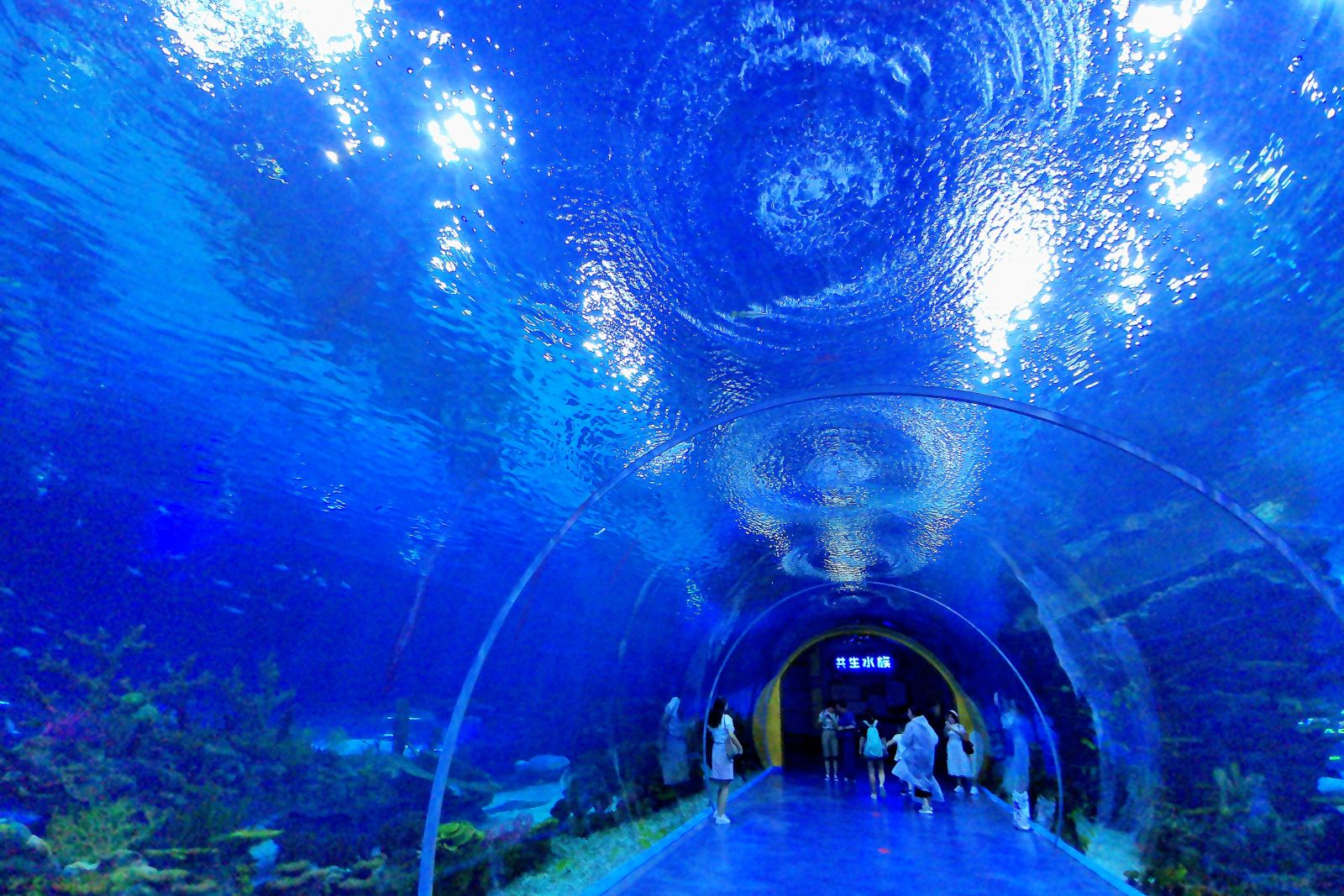Chinese Name: 北京富国海底世界 Pronunciation: Běijīng Fùguó Hǎidǐ Shìjiè
Building Time: 1997
Opening Time: 10:00-17:30
Suggested Visiting Time: 2-3 Hours
Building Area: About 7,800 square meters
Popular Activities: Lectures on marine knowledge, VR move Undersea Adventure, parent-child interaction activity.
Address: The South Gate of Beijing Workers Stadium, Gongti Bei Road, Sanlitun, Chaoyang District, Beijing, China
Building Function: The Beijing Blue Zoo takes “Education, Entertainment and Environment” as its objectives, aiming to show visitors the magical and beautiful underwater world using high technology.
| Tourists | Ticket Price |
| Adults | 150 yuan |
| Children (under 12 years old) |
90 yuan |
1. Free for seniors above 80 years old (valid certificate required).
2. Free for child below 1 meter.
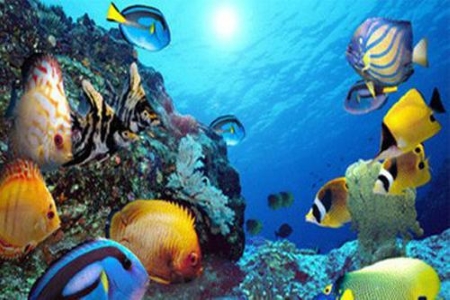
Located under the Artificial Lake of Beijing Workers Stadium, the Beijing Blue Zoo is the first five-star aquarium in Beijing jointly built by China and New Zealand in 1997. It has the longest underwater tunnel made of acrylic glass in Asia with a length of 120 meters. It is currently one of the largest artificial “underwater world” in China with an area of about 7,800 square meters. The main exhibition pool here contains 4.5 million liters of seawater, which raises 600 species, 5,000 sea fishes, and more than 500 species of shellfish from all over the world.
The aquarium is divided into two areas. The first area has a transparent underwater tunnel, which allows visitors to fully enjoy the undersea landscape. There are also many different exhibition zones in this area, including Sea Fish Zone, Touching Zone, Shark & Sea Turtle Zone, Freshwater Fish Zone, and Giant Salamander Zone, which help visitors learn more about sea creatures. The second area has the South Pole Zone and vacuum tank. The vacuum tank, developed by the Beijing Blue Zoo, allows visitors to get close to fish with high technology.
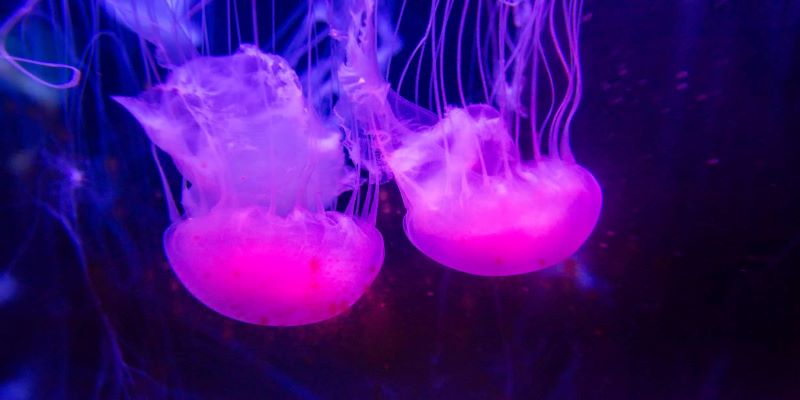
In the Sea Fish Zone, visitors can watch fish and other marine animals from different sea areas and different ecosystems around the world. This zone has many fish tanks, including Brackish Water Fish Exhibition Tank, Coral Reef Ecosystem Exhibition Tank, Seahorse Exhibition Tank, Jellyfish Exhibition Tank, Sea Anemone & Anemone Fish Exhibition Tank, Butterflyfish Exhibition Tank, etc.
In the Touching Zone, visitors can have intimate contact with marine creatures and can experience the feeling of feeding fish like a diver. Here are little Cat Shark, Starfish, Sea Cucumber, etc.
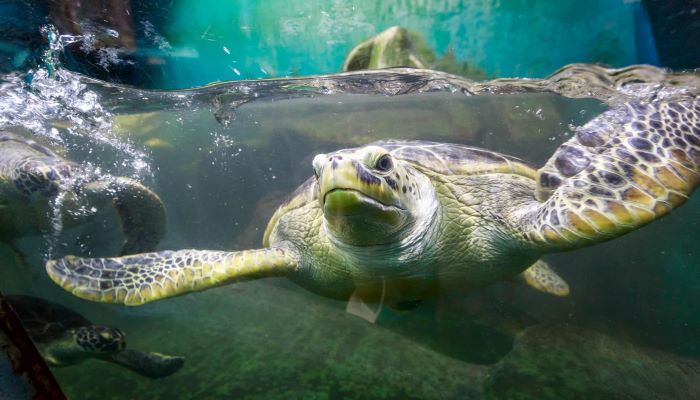
Lemon Shark and Green Sea Turtle are displayed separately here. The Lemon Shark is generally about 2.4 to 3 meters, with a yellow-brown body. The Green Sea Turtle has a huge body with a flat round carapace; only the head and limbs are exposed outside the shell. It can live to 100 years old or more.
This area mainly displays fish species living in freshwater waters around the world. Visitors can see representative fish species living in Frigid Zone, Temperate Zone, and Tropical Zone, as well as artificially raised new fish species and exotic-looking tropical fish. This zone is divided into different tanks, such as Sturgeon Exhibition Tank, Amazon tropical fish Exhibition Tank, Blood Parrotfish Exhibition Tank, Diabolepis Exhibition Tank, Symphysodon Exhibition Tank, etc.
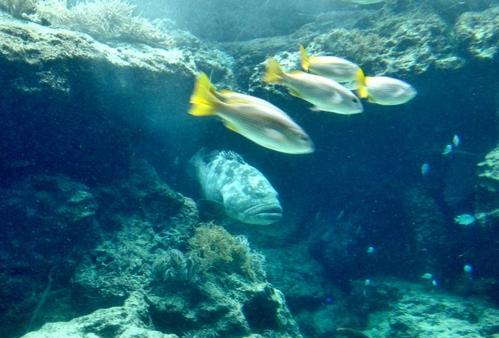
In the aquarium live Two giant salamanders, one of which is more than 80 cm long and is orange-gray. It was originally raised by individuals and then donated to the aquarium due to limited conditions. The timid giant salamanders are usually hiding in the dark or stay under the pebbles, and visitors must look carefully before finding them.
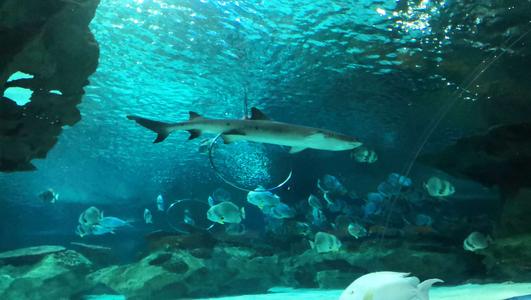
As one of the large marine carnivores, the great white shark is one of the most widely distributed sharks. It is notable for its size, with larger female individuals growing to 6.1 meters around in length and 1,905 to 2,268 kilograms around in weight at maturity. It can swim at speed of 25 kilometers around per hour for short bursts and to depths of 1,200 meters.
It has an extremely sensitive sense of smell and touch. It can also perceive the small currents produced by organisms’ muscle contraction to judge the size and movement of the prey. In addition, the skin of the great white shark is also lethal. The sharkskin is not smooth. Although without scales, it is covered with small barbs, which is rougher than sandpaper.
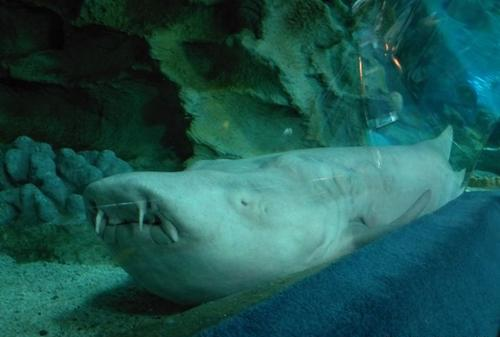
The head of the nurse shark looks like a nurse hat, so it is called “Nurse Shark”. Just as its name shows, the nurse shark has a gentle appearance and good temper and is one of the common shark species in medium and large aquariums. It grows very slowly, so the male sharks mature at 10 to 15 years old, and the females mature at 15 to 20 years old with a length of 3 meters around and a weight of 100 kilograms.
To a large extent, it is a kind of night creature. In the daytime, it usually lies on the sandy seabed or has a rest in its cave; at night, it goes out and hunts. They are very gentle and docile and never attack human beings actively. A nurse shark’s gestation period is 10 to 12 months, with 20 to 40 pups per time. However, each time only several offspring can survive because of the offspring’s ferocious characteristics.
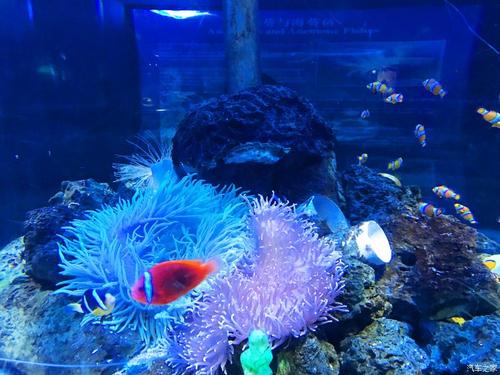
On the face of clownfish, there are one or two white stripes, looking like the clown actor in Beijing Opera, so it is called “Clown Fish”. It coexists with sea anemones. The sea anemone protects it, while it helps to clean up the sand on the sea anemone’s body. Therefore, for tens of thousands of years, anemones and clownfish have been coexisting in the sea peacefully.
Clownfish are not the only hermaphroditic animals, but they are one of the few species that males can become female, but females cannot become males. In the aquarium, there are Tomato Clownfish, Yellowtail Clownfish, and Yellow Clownfish.
| Show | Site | Time |
| Dancing with Sharks | Underwater Tunnel | 10:10-10:20; 14:30-14:40 |
| Sea Lion Show | Underground Ocean Theater | 10:30-10:40 (holiday only); 11:30-11:40; 13:30-13:40; 15:50-16:00 |
| Underwater Golden Storm | Underwater Tunnel | 11:00-11:10; 15:30-15:40 |
| Feeding Turtle | Underwater Tunnel | 11:45-11:55; 16:00-16:10 |
| Parent-child Interaction Activity | Coral Reef Theater | 12:30-12:40 (holiday only); 15:00-15:10 (holiday only) |
The consumption area in the aquarium only provides snacks, water, and sausages. For lunch and supper, there are many popular restaurants close to the aquarium, such as Wagas, Slow Boat Brewery Brewpub, Flypizza & Hoodadak Chicken (Sanlitun), Baoli Ramen, Honglu (Red Stove) Beijing Restaurant (Sanlitun), Haidilao Hotpot, The Taco Bar, etc.
Enter from the front gate of the aquarium → Underwater Tunnel→ Underground Ocean Theater → Exit from the front gate (For a specific travel route, please follow the signs in the zoo).
1. There are free self-help explanations of the creatures beside each tank.
2. Visitors can book tickets through the official WeChat account of the Beijing Blue Zoo.
3. The pram can be stored at the entrance.
Take bus 43, 110, 118, 120, or 403, get off at Chaoyang Hospital Station, and take a 8-minute walking for about 460 meters.
Take bus 515 or 615 and get off at the South Gate of Worker’s Stadium Station.
Take Metro Line 6, get off at Dongdaqiao Station, exit A and take a 14-minute walking toward northwest for 890 meters.
Chinese: 请带我去北京富国海底世界。English: Please take me to the Beijing Blue Zoo.
If you go to the Beijing Blue Zoo from the center of Beijing (Grand Hyatt Beijing), it takes about 20 minutes (about 20 yuan).
If you go to the Beijing Blue Zoo from Beijing Capital International Airport, it takes about 35 minutes (about 80 yuan).
If you go to the Beijing Blue Zoo from Beijing Daxing International Airport, it takes about 75 minutes (about 175 yuan).
If you go to the Beijing Blue Zoo from Beijing West Train Station, it takes about 30 minutes (about 40 yuan).
